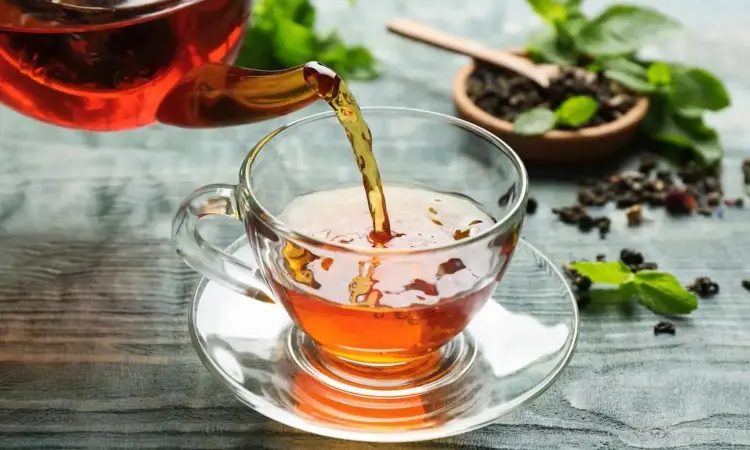- Home
- Medical news & Guidelines
- Anesthesiology
- Cardiology and CTVS
- Critical Care
- Dentistry
- Dermatology
- Diabetes and Endocrinology
- ENT
- Gastroenterology
- Medicine
- Nephrology
- Neurology
- Obstretics-Gynaecology
- Oncology
- Ophthalmology
- Orthopaedics
- Pediatrics-Neonatology
- Psychiatry
- Pulmonology
- Radiology
- Surgery
- Urology
- Laboratory Medicine
- Diet
- Nursing
- Paramedical
- Physiotherapy
- Health news
- Fact Check
- Bone Health Fact Check
- Brain Health Fact Check
- Cancer Related Fact Check
- Child Care Fact Check
- Dental and oral health fact check
- Diabetes and metabolic health fact check
- Diet and Nutrition Fact Check
- Eye and ENT Care Fact Check
- Fitness fact check
- Gut health fact check
- Heart health fact check
- Kidney health fact check
- Medical education fact check
- Men's health fact check
- Respiratory fact check
- Skin and hair care fact check
- Vaccine and Immunization fact check
- Women's health fact check
- AYUSH
- State News
- Andaman and Nicobar Islands
- Andhra Pradesh
- Arunachal Pradesh
- Assam
- Bihar
- Chandigarh
- Chattisgarh
- Dadra and Nagar Haveli
- Daman and Diu
- Delhi
- Goa
- Gujarat
- Haryana
- Himachal Pradesh
- Jammu & Kashmir
- Jharkhand
- Karnataka
- Kerala
- Ladakh
- Lakshadweep
- Madhya Pradesh
- Maharashtra
- Manipur
- Meghalaya
- Mizoram
- Nagaland
- Odisha
- Puducherry
- Punjab
- Rajasthan
- Sikkim
- Tamil Nadu
- Telangana
- Tripura
- Uttar Pradesh
- Uttrakhand
- West Bengal
- Medical Education
- Industry
Tea intake associated with reduced risk of gout

China: Tea is the most popular beverage consumed across India. A recent Mendelian randomization (MR) study published in Frontiers in Genetics has shed light on the causal association between tea intake and gout risk.
The study suggested a causal relationship between genetically predicted tea intake and a reduced risk of gout. The findings underscore the potential advantage of increasing tea intake for gout prevention.
Gout is an increasingly prevalent form of inflammatory arthritis which is caused by the accumulation of uric acid crystals in joints, leading to severe pain, stiffness, and swelling that adversely affect mental, physical, and emotional well-being. Gout management requires a combination of lifestyle modifications and medication.
Tea is a rich source of flavonoids, which has antioxidant and anti-inflammatory properties and may help reduce uric acid levels and inflammation in the body. Although there is no clear understanding of the precise mechanism underlying the potential association between tea intake and gout, recent studies have suggested that tea intake may lower the risk of gout development. Further research is required to establish a causal relationship.
Xiao Liang, Department of Anesthesiology, West China Hospital, Sichuan University, Chengdu, Sichuan, China, and colleagues aimed to explore the relationship causal association between increased tea intake and gout risk by conducting a two-sample MR study.
The researchers employed a bidirectional two-sample Mendelian randomization approach utilizing genome-wide association study (GWAS) summary statistics. Based on rigorous criteria, instrumental variables (IVs) were selected meticulously, and five different MR methods were employed.
Heterogeneity was evaluated using Cochran’s Q statistic, and pleiotropy was assessed using the MR-PRESSO and MR Egger intercept tests. Weak IVs were identified using F values. Single nucleotide polymorphisms associated with confounding factors or outcomes were excluded by consulting the Phenoscanner database.
The study led to the following findings:
- The study included one dataset related to tea intake (ukb-b-6066) and three datasets related to gout (ukb-b-12765, finn-b-M13_GOUT, and finn-b-GOUT_STRICT).
- The forward MR analysis suggests a causal relationship between increased tea intake and reduced risk of gout in all three gout-related datasets.
- The reveres MR showed an increased risk of gout (ukb-b-12765) was significantly associated with low tea intake according to the IVW analysis [OR: 0.0062]. However, this association was not observed in the Finn-b-M13_GOUT and Finn-b-GOUT_STRICT [OR: 0.9992 and OR: 0.9996 respectively].
- No significant heterogeneity or potential pleiotropy was detected, and the possibility of weak IVs was also excluded.
"Our findings suggest a causal association between genetically predicted increased tea intake and a lowered gout risk, contributing to the existing literature on the potential health benefits of tea intake," the researchers wrote. They point out that the study underscores the value of MR analysis in elucidating causal relationships between exposures and outcomes.
"Our study has limitations that warrant consideration when interpreting the findings. There is a necessity for further investigation to validate our results and to investigate the underlying biological mechanisms," the team concluded.
Reference:
Liang, X., Cai, J., & Fan, Y. (2023). Causal association between tea intake and risk for gout: A Mendelian randomization study. Frontiers in Genetics, 14, 1220931. https://doi.org/10.3389/fgene.2023.1220931
Dr Kamal Kant Kohli-MBBS, DTCD- a chest specialist with more than 30 years of practice and a flair for writing clinical articles, Dr Kamal Kant Kohli joined Medical Dialogues as a Chief Editor of Medical News. Besides writing articles, as an editor, he proofreads and verifies all the medical content published on Medical Dialogues including those coming from journals, studies,medical conferences,guidelines etc. Email: drkohli@medicaldialogues.in. Contact no. 011-43720751


